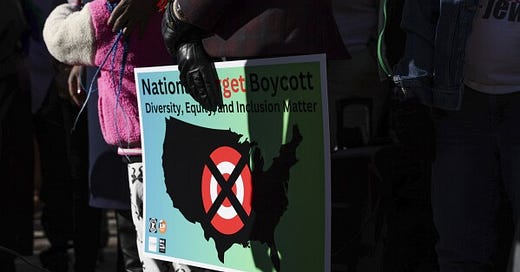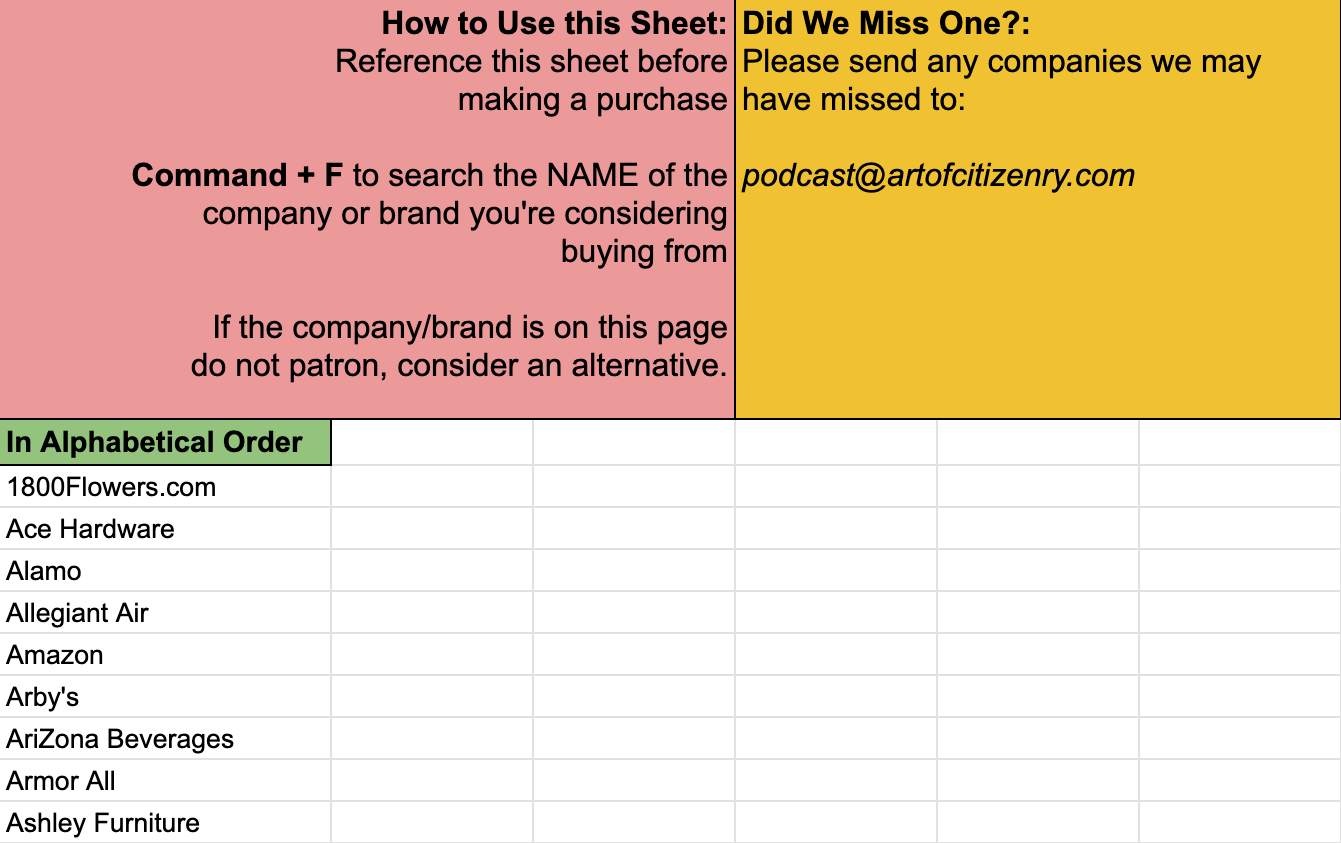Crony Capitalism, Human Rights, and the Rolling Back of DEIA
It all comes down to corporate accountability.
Corporations have played a significant role in propping up Donald Trump – from his election to now his time in office. Prime seats at the inauguration were occupied by tech CEOs and billionaires, who are among the world’s richest men. Crony Capitalism, also referred to as Cronyism, is a political-economic system where businesses and the government work together to their own advantage. As political and corporate leaders co-mingle interests in an increasingly symbiotic relationship, the gap between the elites and the broader public widens, creating long-term consequences for society as a whole, with billionaires gaining unchecked influence on governance and regulations.
Consider Where You Spend
From backing the Trump campaign and pandering to his ego to using this moment as the “green light” to discontinue DEI policies and initiatives, corporations have immense power within our system. This is why, as consumers, we have the power to decide which engines we wish to fuel with our buying power. Consider who you are supporting, and research the brands you shop from. To consolidate so much of the info out there, our team (shoutout to our producer, Aly) has made a Google Sheet documenting the companies that have supported Donald Trump in some capacity. Use it by searching the name of the company you are planning to shop with (a simple Command + F will prompt a search bar for convenience). This is a living, working document, so feel free to let us know if there are companies missing from the list (we are sure there are).
The Rolling Back of DEIA is a Human Rights Issue
Organizations and businesses continue to roll back commitments to “DEI initiatives.” From the sunsetting of committees to the withdrawal of commitments to hire, train, pay, and source equitably, the range of initiatives that will no longer receive sustained investment or institutional backing is vast. The current political upending of efforts to promote equity and remedy systemic discrimination is of human rights concern. This is part of a corporate strategy to absolve the ruling class of its legal and moral obligations to maintain a fair and equitable workforce.
From challenging funding for Black Women-owned businesses to the emergence of a new acronym, “MEI” (merit, excellence, and intelligence), these efforts are fueled, in part, by a distorted and misinformed perception of DEI’s objectives, mischaracterizing its purpose and undermining its benefits. The reality is: it is not just DEI that is under threat, workers' rights in general are being actively gutted by the current administration. We need to ask ourselves, who benefits?
Worker rights are political. Corporations have frequently made public commitments to upholding human rights, equity, and sustainability, using these pledges to bolster their reputation and market themselves as responsible businesses. These commitments, however, are often simply lip service. Instead, corporations have fallen into the misinformed trope that DEI is an attack on the formally educated, historically celebrated, and rarely forgotten or silenced white men in America. It is baffling how many corporations (including “ethical” ones) have discredited the importance of initiatives that address salient human rights issues within organizational structures and supply chains.
The rollback of DEI initiatives has exposed a fundamental truth: corporate pledges to equity and human rights are not rooted in principle, but (unsurprisingly) in profit. Target’s backtracking on its DEI commitments was not a reflection of genuine ideological opposition but a calculated move to appease certain stakeholders. Ironically, the very same factions they sought to placate have now turned against them, with shareholders suing the company for failing to disclose the financial risks of alienating marginalized consumers. This reaffirms that, for corporations, DEI is not a moral imperative but a business strategy—one that is expendable when deemed inconvenient. Yet, we obviously have the power to make these decisions financially damaging when abandoned.
These changes have tangible and devastating consequences. Jobs are lost, and with DEI initiatives being rolled back, long-standing protections against discrimination in hiring—based on race, age, appearance, and other identity markers—are increasingly being eroded. While many white women voted for Trump, it is crucial to recognize that white women have been the primary beneficiaries of DEI initiatives. The data shows that white women have benefited the most from corporate diversity programs, affirmative action, and leadership pipelines, often at the exclusion of women of color. Their proximity to power—specifically to white men in executive positions—has historically positioned them as the most visible recipients of gender-focused workplace equity efforts. Now, as DEI commitments are being dismantled, the very structures that enabled white women to ascend in corporate spaces are vanishing, exposing the reality that these initiatives were never designed with racial equity at their core. The gutting of DEI is not just a loss for Black and Brown communities; it is a regression that will impact all marginalized groups—including those who have historically benefited the most.
Some humor to help us navigate the absurdity. “If your company is sucking up to Trump by dismantling DEI initiatives, The Daily Show has you covered with this HR training video to help workers unlearn all those "woke" teachings.” —
DEI Case Study: Target
Over the years, Target has made lofty commitments to “respecting human rights throughout our operations.” According to a page of their website dedicated to their human rights commitment, some of the focus areas to salient human rights issues for targets include “inclusive merchandise assortment and marketing promotions” and “diverse workforce and equitable hiring and development practices.” However, these promises appear increasingly hollow in light of Target’s recent actions, exposing the immense power that political agendas truly have on corporate accountability and their willingness to uphold human rights.
On January 24, Target announced that it would roll back its previously stated DEI goals, including efforts to increase Black employee representation and advancement, enhance the shopping experience for Black customers, and support Black-owned businesses. The company also revealed plans to discontinue participation in external diversity surveys such as the Human Rights Campaign’s Corporate Equality Index. Additionally, in a move signaling a broader retreat, Target stated that it is “further evaluating our corporate partnerships to ensure they are directly connected to our roadmap for growth,” effectively deprioritizing its public commitments to considering human rights.
The Human Rights Campaign’s Corporate Equality Index has been a frequent target of anti-DEI sentiments, which can only be described rightfully as a “coordinated campaign” by the same actors behind the wave of anti-LGBTQ+ legislation.
What do I mean by “Salient Human Rights”? Salience refers to identifying, prioritizing, and addressing a company’s most significant adverse human rights impacts (aka issues that have the potential of causing the most harm).
This rollback is not occurring in a vacuum. It reflects a broader shift in corporate behavior amid an increasingly hostile political climate toward DEI initiatives. In recent years, diversity, equity, and inclusion efforts have become a lightning rod for conservative backlash, with right-wing politicians and media figures framing them as divisive and unnecessary. Target’s decision to scale back its DEI efforts underscores how corporate commitments to social responsibility are often contingent on political expediency rather than principle. While these companies may tout their values in times when the ideas are popular and drive sales of relative stability, their willingness to retreat under political pressure reveals the fragility of their commitment.
Policy Case Study: Meta
Meta, like many other companies, has been enabling the Trump political narrative – from making abortion content harder to find to ending DEI programs. In January 2025, Meta CEO Mark Zuckerberg announced a significant shift in the company's content moderation strategy. This move signaled a departure from previous commitments to monitor and mitigate harmful content like hate speech and targeted harassment. Zuckerberg justified the change, emphasizing a return to Meta's foundational principle of “protecting free speech.” However, this policy shift contravenes established human rights norms, which recognize freedom of expression as a fundamental right but also permit limitations to protect individuals from harm.
Freedom of expression is a fundamental human right, but it is not absolute and can be restricted to safeguard other rights and societal interests, such as preventing imminent violence. The International Covenant on Civil and Political Rights (ICCPR), a legally binding treaty, affirms that everyone has the right to seek, receive, and share information and ideas. However, the treaty also recognizes that this right may be limited when necessary to protect “the rights or reputations of others.” Moreover, it mandates restrictions on speech that constitutes “advocacy of national, racial, or religious hatred” when such expression incites discrimination, hostility, or violence. By scaling back its moderation efforts, Meta risks enabling the proliferation of harmful content, essentially creating an environment that allows for the infringing on the rights and dignity of vulnerable groups. This is in direct contradiction to Meta’s commitment to the UNGPs.
First-Hand Implications
The ripple effects of these DEI rollbacks aren’t just theoretical—they’re hitting small businesses and independent entrepreneurs hard.
Let me be vulnerable. Two weeks ago, I sat in a coffee shop, finally coming to terms with the fact that my social impact and equity consulting business is struggling to sustain itself. This work has allowed me to finance the educational content I have released for years. However, with more companies caring less about impact reporting, impact communication, supply chain equity, and equity initiatives as a whole, my message and work are effectively considered disposable line items on budgets.
Just last week, while finalizing this newsletter, I got a text from my good friend Chloe, an incredibly talented photographer who has shot events for companies like Salesforce and ESPN Women. A lot of her work has been funded through DEI budgets, and with those drying up, the landscape has drastically shifted for her business. So, here’s a quick plug: if you or anyone you know needs a photographer, reach out to her. This is what community looks like—supporting each other when the systems in place won’t.
Items of Interest
GoFundMe Directory - Families, Individuals, and Businesses
GoFundMe Directory - List of Displaced Black Families
Petition Against National Abortion Ban - At a global scale, the Trump administration has reinstated the Global Gag Rule, which restricts U.S. foreign assistance to organizations providing, counseling, or advocating for legal abortion services.
Tune in
Did you tune into last week’s episode of Art of Citizenry podcast? We explored the economics of immigration detention with Anthony Enriquez of Robert F. Kennedy Human Rights. Since recording the episode, Congress passed the Laken Riley Act, which further fuels the immigrant detention industrial complex under the guise of public safety.
Invest in the Podcast
Art of Citizenry is proudly independent. This allows us to speak with raw honesty about the ways people, brands, and organizations perpetuate colonial legacies. Here, we embrace the power of nuance and unfiltered truth, believing that meaningful growth emerges when we face complexity head-on. Support us as we critically explore, challenge, and unravel mainstream narratives by empowering listeners with accessible, nuanced perspectives. Your support directly sustains our podcast, helping cover the wages of our dedicated three-person team.
Please consider supporting by visiting: patreon.com/manpreetkalra
To make a one-time contribution, you can do so here: visit.artofcitizenry.com/paypal
I want to hear your reflections — share your thoughts in the comments section. If you found this newsletter insightful, please like and share it forward! Thanks for reading.





